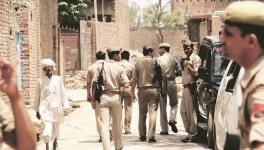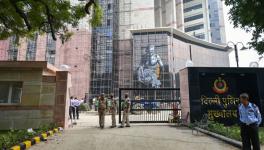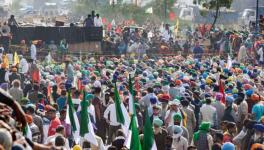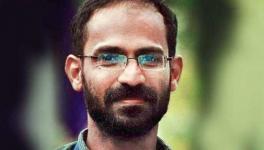The Tragic Innocence of Being Faisal Khan
Irony died a thousand deaths on Monday, 2 November, when 48-year-old non-violent activist Faisal Khan, a founder member of a revived Khudai Khidmatgar, was arrested by the Uttar Pradesh police. The charge against him is that he spread disharmony and hurt religious sentiment, by offering namaz at a Krishna temple in Mathura. He and three other members of his organisation, whose name roughly translates to “servants of god”, have been charged by the police, though Faisal is the only one arrested so far.
Faisal was arrested at “Sabka Ghar”, a centre for communal harmony he has established near Ghaffar Manzil. People of all faiths can stay at this centre and celebrate festivals of all religions together. He had revived the historic Khudai Khidmatgar, an organisation established by the legendary Abdul Ghaffar Khan, also known as Frontier Gandhi, whose role in the anti-colonial struggle has been documented in South Asia and the world.
Faisal himself is well-regarded for his deep knowledge of Hindu and Islamic religious traditions and scriptures, and it is for promoting harmony within India, and between India and Pakistan, that he is most recognised. He and his team have also provided relief to people devastated by communal riots or natural disasters.
Faisal and his group had completed an 84-kilometre parikrama or circuit of Braj in Mathura between 25 and 29 October. The aim of the journey was to foster communal amity. They visited a number of temples along their route, met with priests and holy men, and held discussions with them. What seems to have irked those who filed the FIR was a stopover of the group at the Nand Baba temple in Mathura, during the last leg of their tour. Here, too, they are known to have discussed with the priest the “oneness” of all religious messages, among other things. This is where, on 29 October, two members of the visiting team offered namaz, with the willing permission of the priest.
Now that a case has been registered, it is expected that the judiciary will take a more nuanced view of this case. Faisal has invested his entire life to building bridges between communities. As a number of prominent religious, social and political figures said in a recent statement, there is a contradiction in the charges that have been slapped on him and the other members of Khudai Khidmatgar by the police. “Faisal Khan is doing important work of an antidote to the poison that communal forces are spreading in the society…How can those who are taking out a parikrama for peace and communal harmony have the objective of inciting religious sentiments?” the statement says.
Recently, the Supreme Court quashed a similar criminal complaint filed against cricketer Mahendra Singh Dhoni. According to the complainants, Dhoni “hurt religious sentiments” when on the cover photo of a magazine he was shown as a multi-faceted talent, in the form of the Hindu god Vishnu. This complaint was filed in an Andhra Pradesh court. A three-judge Supreme Court bench of Justices Dipak Misra, AM Khanwilkar and MM Shantanagoudar said it would be a “travesty of justice” if prosecution proceeded in such a “frivolous” case.
What matters here is the deliberate criminalisation of the episode involving Faisal and his comrades at Nand Bala temple. It once again signals efforts to erase India’s heritage of syncretism, where the mazars of Sufi saints are regularly visited by Hindus and Muslims and where Sayyid Ibrahim, a Kabul-born Pashtun from the 16th century, became a devotee of Krishna and wrote verses eulogising him (using the name Ras Khan). Then the earliest translations of the Ramayana and Mahabharata into Bengali were commissioned by Muslim rulers and the core team of the last independent nawab of Bengal, Siraj ud-Daulah, consisted of four Hindus and two Muslims.
The extent of toxicity that pervades India today can be gauged from what Prof Anil Singh, a noted Hindi poet who teaches Hindi at Saket Degree College, Ayodhya, recently told a journalist sarcastically. He said that even Tulsidas, the 16th century author of the Ramcharitmanas, would have been a “culprit in the eyes of mentally bankrupt politicians”, for they would have seen his verses as guilty of the crime of nurturing amity. “Tulsidas is the fittest case to be booked, for he openly challenged fanaticism in his couplets,” the author said, citing one of his verses. “Tulsidas had said... he could be called a Hindu or a Muslim, and that he wouldn’t mind sleeping in a mosque as he did not care for fanatics,” Singh explained.
Though the saga of Faisal’s arrest is not over yet, they bring into focus the limitation of a world-view that many still hold dear in India. A section of people still want to usher in communal amity, and they sincerely believe invoking India’s composite culture is an antidote to the growing weaponisation of religious identities. What they forget is that the idea of a composite heritage has a context and history. The anti-colonial struggle faced the arduous task of uniting a population which had never ever participated in any national movement, which is spread over a vast landmass, and is divided into castes and communities, against a more advanced enemy. In his introduction to Ramdhari Singh Dinkar’s four volumes, Sanskriti Ke Chaar Adhyay, published in 1956, the first prime minister Jawaharlal Nehru wrote: “...culture of Indians is composite and has developed gradually”. He mentioned its “amazing ability” to integrate and internalise new things it encountered. “Until it had this quality, this culture remained alive and dynamic. But later it lost this dynamism due to which this culture atrophied and all its aspects became weak,” Nehru wrote.
Of late, though, critical questions are being raised to unpack the phenomenon of a composite heritage. Recently, journalist and writer Kapil Komireddi, in his book Malevolent Republic, questions the “airbrushing” of India’s pre-colonial past and questions the wish to “bypass awkward questions” about the past. Historian Upinder Singh says in her book Political Violence in Ancient India, “The idea of a peace-loving, non-violent India exists, persists, as part of a selectively constructed and assiduously cultivated national self-image in the midst of a society pervaded by social and political violence...” According to her, the pioneers of the independence struggle were instrumental in creating this “myth of non-violence in ancient India which obscures a troubled, complex heritage”.
It is important to extend this debate to the present time, so as to find a way to fight the intermixing of religion and politics in India. What new slogans could further the anti-communal struggle and secularisation of society? What means can ensure that the Indian republic emerges as a truly secular state? These issues confront all Indians today. But right now the most important message is what the National Alliance for People’s Movement said after Faisal Khan’s arrest: “Prison is no place for messengers of love and brotherhood.”
The author is an independent journalist. The views are personal.
Get the latest reports & analysis with people's perspective on Protests, movements & deep analytical videos, discussions of the current affairs in your Telegram app. Subscribe to NewsClick's Telegram channel & get Real-Time updates on stories, as they get published on our website.
























